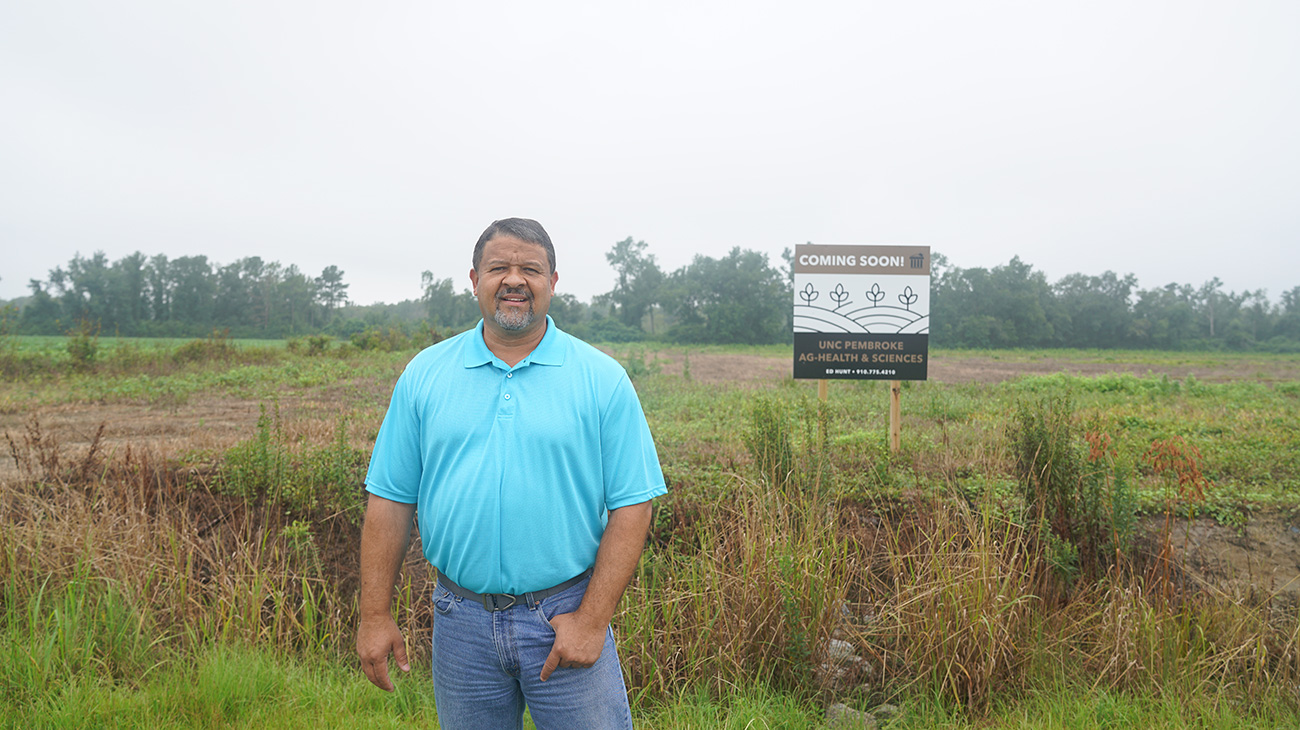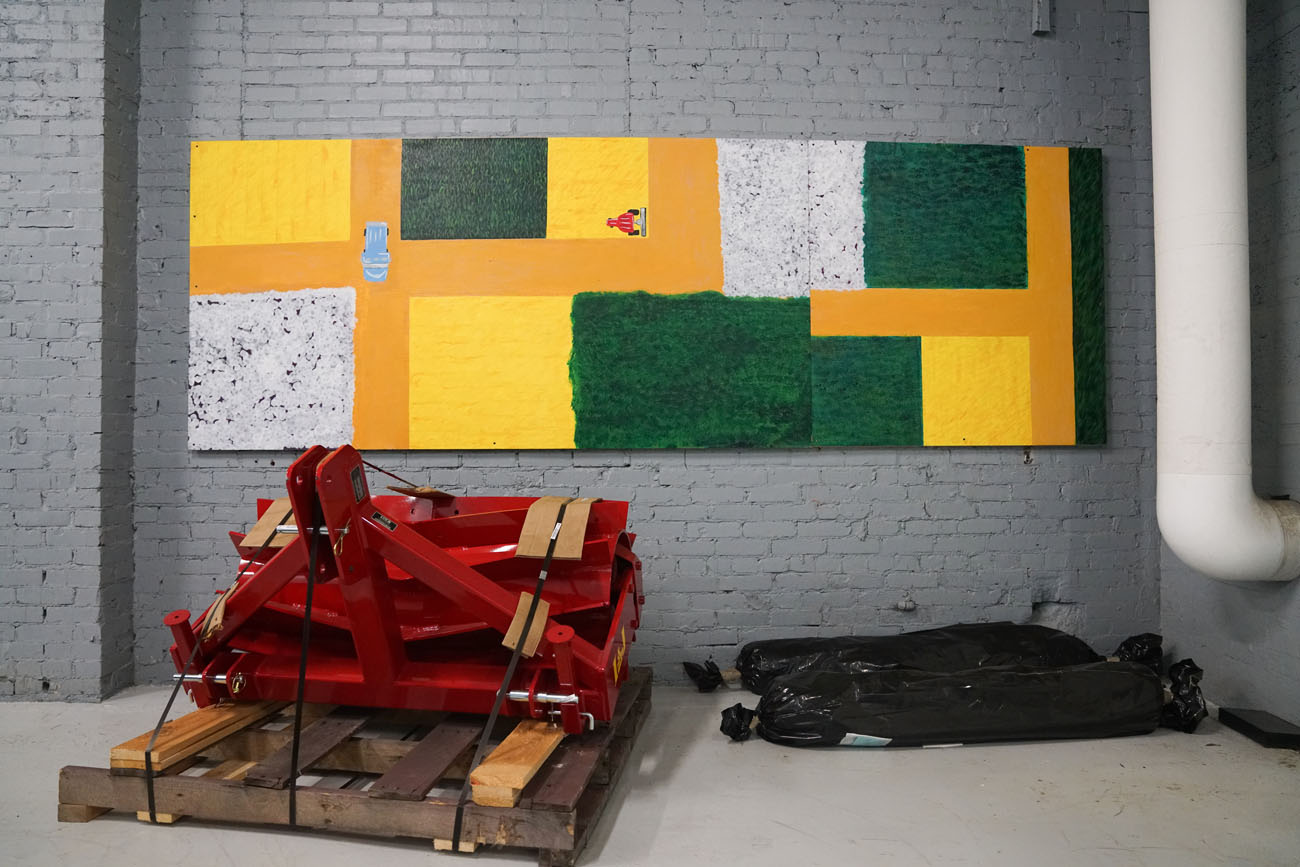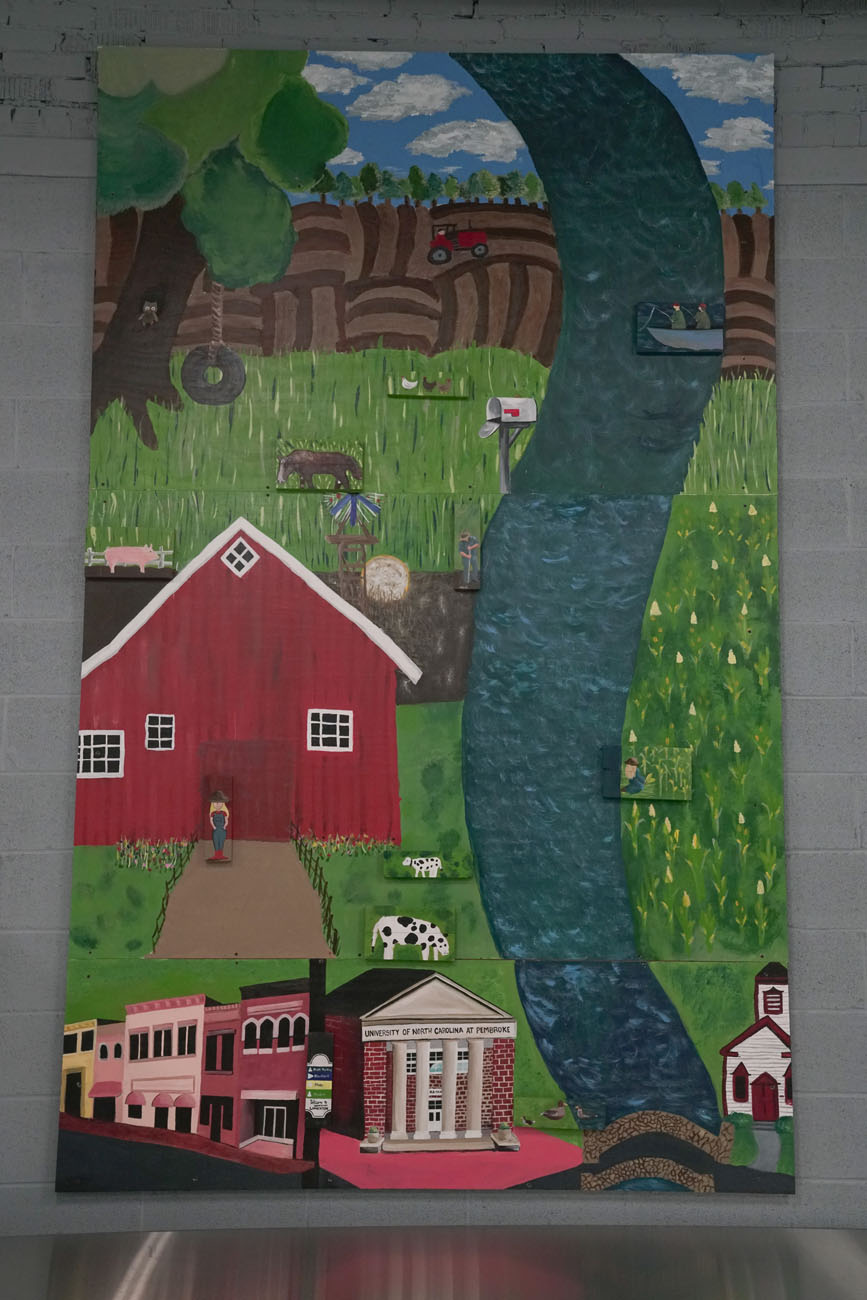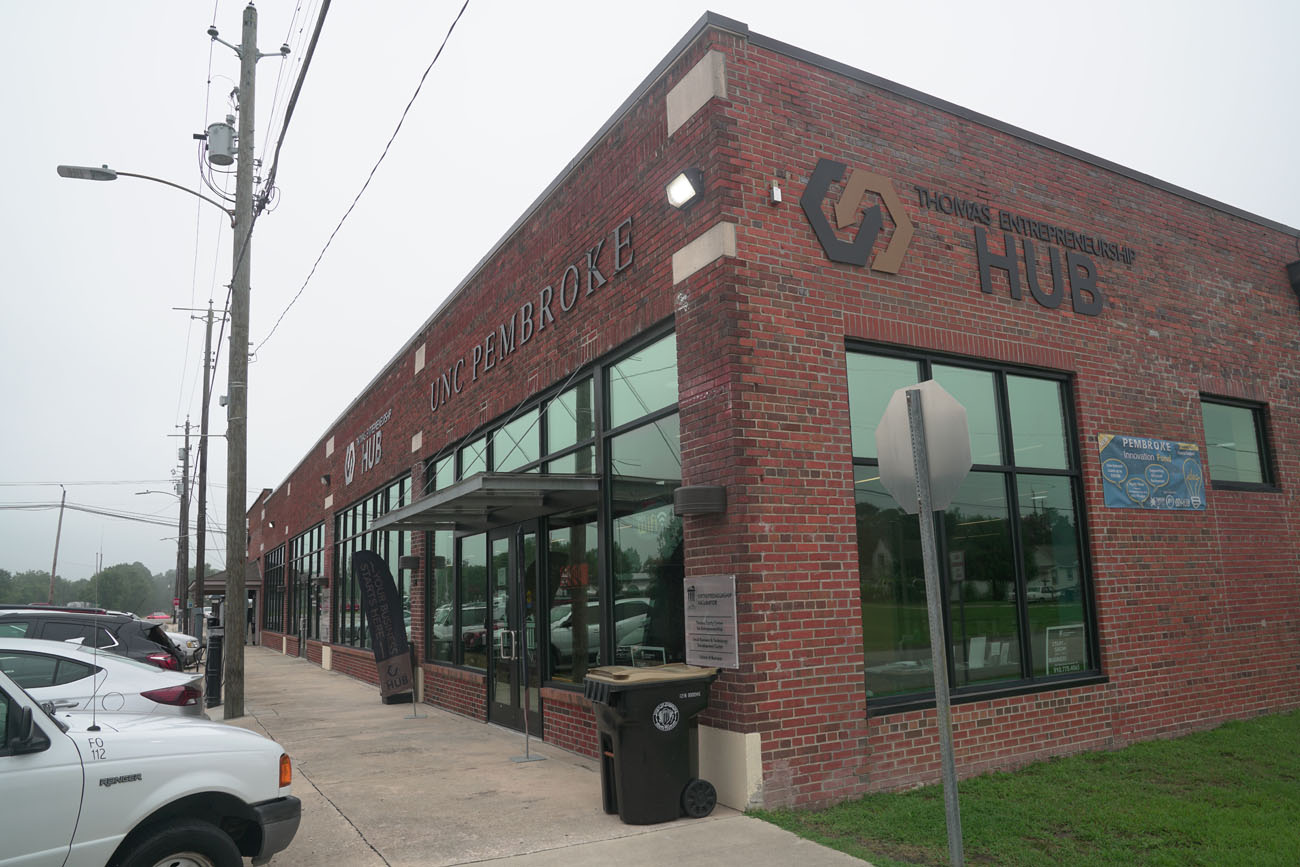Historically, farming has been an essential way of life in the Sandhills region of North Carolina. However, smaller-scale local farms have steadily disappeared in the wake of large industrial farms and globalization. The persistence of large, commercial farming challenges the sustainability and even survival of smaller local farms. The inability to produce food and crops for local consumption has led to food deserts within Scotland and Robeson County.
In this two-part consideration of the future of farming in the region, two farmers discuss the urgent need for local agriculture and how they’re reviving it as a productive way of life in their communities. Both Davon Goodwin and Ed Hunt call into question who the next generation of farmers will be and seek ways for Black and Indigenous community members to enter the profession. Their work is actively informed by the sordid history of Black and Indigenous people working the land, whether voluntarily or through enslavement. These pieces include discussions on innovations in agricultural practices, the power of ownership with a mentality of stewardship, and how bringing new generations to farming has the potential to have lasting local economic impacts while also nurturing community. —Morgan Augillard and Joey Swerdlin, Along the Lumbee River report editors
Read Can Two Black Millennials Come Out of College, Farm, and Get it Right?, part I of our exploration on the future of farming.
Morgan Augillard and Joey Swerdlin interviewed Ed Hunt in 2020.
The following has been edited for length and clarity.
Morgan Augillard (MA): What is your role at The Thomas Entrepreneurship Hub at the University of North Carolina at Pembroke (The Hub) and what is the overall mission of the center?
Ed Hunt (EH): About six years ago, a donor, James A. Thomas, stepped in and said, “We need to figure out a way to improve entrepreneurship in our region.” He established the Thomas Entrepreneurship Hub, which houses a business incubator for new entrepreneurs. A few years later, the director of The Hub, Thomas Hall, received the grant to support a sustainable coordinator at The Hub.
We’re located in a renovated retail space in downtown Pembroke, outside of the main campus, and it’s amazing. I remember this place where The Hub is now located as being a shoe store and a furniture store as a kid. Most of the farmers we work with know exactly where I’m at downtown as soon as I mention the former furniture store. Since it’s not on campus, it’s easy for them to get here; there’s a lot of parking available.
I got brought in October of 2018 under a Kate B. Reynolds Charitable Trust Grant. My job is to develop agriculture (ag) businesses, and jobs around agriculture, here in Southeast North Carolina. We’re in a place now where my generation has lost the connectivity with the farm, and agriculture today is still the most important program that we can consider when it comes to taking care of our health, our clothing, and our fuel.
There are lots of opportunities when it comes to entrepreneurship—including in agriculture. I help small farmers develop business plans, work in new sustainable ag innovations, and understand how these new systems work. In the past, we’ve seen that our small farmers are struggling in many different areas, including some simple and plain ones around equality. They aren’t able to receive benefits from the county, state, and federal institutions that are available to larger, more commercial farms. I help them with that, and with getting the training they need to continue growing.
The average income here is about $27,000 a year, and the community has a lot of needs around workforce development. Our region is very poor, but very rich in natural resources including fresh water and land. Teaching these young farmers a new style of agriculture is really important to helping them work more efficiently.
Joey Swerdlin (JS): What has UNCP’s involvement with agriculture previously been?
EH: Let me give you a little history here. UNCP had an ag program back in the early ’70s. During that time someone decided it wasn’t important anymore and the university moved away from it. The university has been long known for teaching and the business school, but today as we start to explore other ideas that could definitely improve our region, agriculture is coming back to the table. As we look around Southeast North Carolina, we have a lot of biotech companies that are working in this region, and a lot of people who are foodies—they want to know where their food is coming from and how it’s grown. But it’s the students now who are really pushing for this.
MA: You mentioned that The Hub connects with farmers. Are these farmers also university students? Or are you reaching beyond students?
EH: Right now, we’re building the Good Agricultural Practices (GAP) certification program under the biology department for our students. GAP is meant for existing farmers and potential new farmers, but this year we’re going to open the door to students who want to get this GAP certification under their belt.
GAP certification for farmers is becoming more and more important because it helps reduce spreading diseases and pesticides and all these other things. We know that a GAP-certified farmer is probably the cleanest farmer that’s out there. We’re also going to pay for their first year of membership with the Carolina Farm Stewardship Association.
I also know the community real well, though. I moved away, got an education, and came back. I’m a farmer as well, and I know that farmers in the region have always had struggles with getting farm loans, operating capital, equipment, and contracts. The GAP programs that we offer are strategically directed towards communities of farmers that need this certification: often folks that aren’t necessarily directly involved with UNCP.
MA: Are these farmers at different levels of farming knowledge and experience?
EH: Oh yes. Some of what they still do is traditional row cropping. Through this training, we’re looking for them to use innovative ag ideas to lower impact to the natural environment. One technique is using plastic high and low tunnels (temporary greenhouse-like hoop structures) to protect crops and elongate the growing season. Other ideas are building up the quality of the soil by adding organic matter and microorganisms as a cover crop, which reduces the need for synthetic fertilizer, and using drip irrigation, which is much more efficient than overhead irrigation systems.
So these guys are coming to me and they’re like, “Ed, I really want to get certified, but the cost of that certification is $1,500 for the first year, and it’s about $300 every year after.” If they’re serious about it, we get the USDA inspector out there, and if they pass inspection, we pay for their first year of certification. That helps them stay in business.
I also follow them really closely when it comes to applying to Natural Resources Conservation Service (NRCS) equipment funding. NRCS has some funds out there to help these farmers in the first year. Digging a deep water well and setting up a high tunnel is big money; the equipment cost is right around $15,000. I help them with their application and make sure that they follow through on all this stuff. The first foundation is getting GAP certified and then NRCS certified to apply for these grants.
MA: You’ve previously called this region a food desert. How do you define food desert, both personally and in the context of your work?
EH: A food desert is an area where you can’t buy locally grown foods, such as your cabbage, your collards, your carrots; that sort of thing. We do have local grocery stores, but this stuff is coming in from other areas. We don’t have a lot of local farmers markets that are helping farmers grow produce through CSAs (community-supported agriculture). We do have one small farmers market up in Lumberton, but it’s really not adequate enough to supply the demands we have in the whole region.
Since we don’t have a proper set of farmers markets, we’re working on building a farmers co-op where we pair restaurants with the farmers that we work with. Through this farmers co-op, we’re going to try to approach Campbell’s Soup to figure out ways that we can contract growing opportunities between them and local farmers in hopes of improving the economy in this region. We also work closely with farmers to find ways to sell their produce, including setting up food-distribution networks where local farmers are able to sell to the universities and other companies. We can grow literally anything in this region because of our environment, so it’s working fairly well. There are probably about five wholesale companies that are really looking at what we’re doing.
MA: We wanted to get a little more information about your work with Native American farmers. Is supporting these farmers a particular focus of your work at The Hub, or has it happened by virtue of the fact that there is a large Native American community in the area?
EH: There is a large Native American population in the area. UNCP was founded as a Native American-serving university many years ago. This region is home to more than 50,000 Lumbee Tribe-enrolled members. Some of my interest is a personal interest, but the door’s open for everyone.
I have certain accounts that I oversee to help folks in different ways. One of them is the Native American Trust Fund that helps Native people develop business ideas into working businesses, create Employer Identification Numbers (EINs), set up Limited Liability Corporations (LLCs), and create agricultural business plans. The other focus that I have in working with Native people is building a community development financial institution (CDFI) to help access funding with little interest, which would improve the economy in the area. There’s a lot of CDFIs out there, and right now there’s a big push from several agencies to build these CDFIs in rural areas such as this one, as there is only one Native CDFI in the state of North Carolina.
This region is like any other federal property that’s classified as a reservation. We do have crime; we do have drug issues and alcoholism. We don’t have jobs and there’s poverty. More than 37% of the Native population here lives in poverty, though most people probably don’t know that they live in poverty. We’re trying to achieve equality on many levels here: not just for Native people, but all across the board, so that we can bring up particular jobs in the region.
As a kid growing up here, my grandfather was a 500-acre tobacco farmer. He fed a lot of people. He gave people jobs. I grew up in agriculture, and I’m still a farmer today. It’s important that my kids see what I do so that they understand that you can help provide food to local populations. I got three daughters, and they’re learning now what it means to manage and operate this farm. My goal is to teach them that we gotta stay focused on food production.
MA: You’ve spoken a little bit about your life and your way to this work, but it would be great to hear more about where you’re from, how your personal history feeds into this work, and how you got into it.
EH: I grew up about three miles down the road, outside of Pembroke in a small community called Prospect. As soon as I got out of high school, I started school down in the next county at Southeastern Community College in the forestry program. The North Carolina Community College system gave me a foundation to do their “2 + 2 + 2” program.
I got very lucky because I was in a program where I had a lot of people watching me. I was probably the only person of color in the program. I didn’t know it until I was probably halfway through the program that I was a little different than the rest. But I had an advisor that stayed on top of me about my grades and transferring them onto another school. I went on to Western Carolina University to complete my bachelor’s degree and graduate school at NC A&T (North Carolina Agricultural and Technical State University).
I moved around a little bit after that and came back home in ’04 to work at the local community college. I worked about 12 years in curriculum development for the community college system, which includes about 58 schools throughout NC. I really enjoyed the work because I am a builder; I love building programs. I love doing labs, teaching, and lecturing about where we’ve been and where we’re going. It’s absolutely amazing to see people learning about things they’ve had an interest in.
When I hit the ground in ’04, one of the things I really wanted to achieve was to understand what apiculture really meant, especially since my grandfather was a beekeeper. After a few years of independent research, I joined the North Carolina Beekeepers Association (NCBA), where I hosted two state meetings with around 900 people. It was really fun, and a lot of money flowed through to Lumberton hotels and restaurants. I served with them about six years. During that time I had a mentor, Dr. John Ambrose, pushing me to move through the four levels of beekeeping certification. Sadly, after reaching the third level, my mentor passed away, and I kind of moved away from the program.
All this stuff is interconnected. During my time with the NCBA, I learned so much about the natural environment. One of the dangers is that it’s really really fading. It’s fading away because we’re using GMOs and contaminating our surface and some of our subsurface water supplies. This has impacted bees similarly to how it impacts humans.
MA: Are you still beekeeping and producing honey, or are you farming something else on your personal farm?
EH: I have two tracts of land on my personal farm and both of them have wooded areas, so we do some forestry operations. The rest is commodity crops (corn, soybeans, and wheat). We’re under some water right now, so we’re probably going to see some losses—not just from having a wet growing season, but also COVID’s gonna send some issues along our way too for the fall when it comes time to sell.
In regards to the bees, I lost probably 47 out of 50 colonies during the last floods in 2016 and 2018. It’s probably going to take me about three years to rebuild what I had. It’s a lot of work; takes a lot of understanding to be a beekeeper. Really the purpose of having all the honeybees was to develop new beekeepers in the region, to help get them started. I also teach apiculture classes to UNCP students or anyone who wants to learn more about it.
MA: What is population growth like in the region? Do you see the same patterns of population growth that are projected for the global scale reflected in your community?
EH: A lot of folks in this region—just like any other rural area in North Carolina—after they get through high school, they go get an education, and then they never come back because there’s not a lot here. My goal was to come back. My family’s here, and I wanted to have a family. But generally, more people are moving out than moving in.
You start looking and thinking, “What can I do to help with poverty?” My question to myself everyday when I get to work is, “What is it that I can do?” At five o’clock every day when I’m going home, that question is still on my mind, and it kind of bothers me. When you’re going home and you can’t say that you achieved anything, then it kinda keeps you up all night. I take the work I do very seriously. This is my community. It is my region, and if I don’t do it, it won’t get done. That’s the way I look at it.
The next generation is coming regardless of what we say or do. We want to make sure that we’re paving that road and we’re paving it solidly so the next generation won’t have to deal with what we had to deal with.
Biographies
is the Director of Sustainability at The Thomas Entrepreneurship Hub, UNC Pembroke. Hunt is a native of Prospect, North Carolina.
The views expressed here are those of the authors only and do not reflect the position of The Architectural League of New York.




